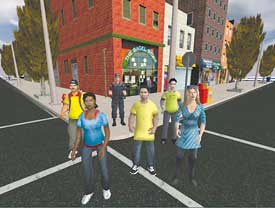Suki’s dream to become a computer scientist after attending Cornell University on a student visa unexpectedly became a nightmare.

The immigrant teen from Japan unknowingly violated his visa requirements by only taking nine credits his first semester.
His story doesn’t get better when video game players in “I Can End Deportation” (“ICED”) incorrectly answer several questions about immigration laws. This means an immigration officer detains and sends Suki to a detention center, then Homeland Security deports him.
Suki is a video game character, but his journey represents the real life stories of millions of detained and deported immigrants in the United States. Multimedia efforts like “ICED” are used by the international organization Breakthrough to promote human rights in the United States and India, says its executive director, Mallika Dutt.
Dutt spent the month of March as the 2008-09 Twink Frey Visiting Social Activist at the Center for the Education of Women. Her visit involved giving lectures about the importance of human rights issues and creating a strategic plan for her organization, which celebrates its 10th year in 2010.
“We believe everyone needs to be a human-rights activist,” she says. “It’s not isolated incidents happening (outside the United States). It’s about what’s happening in your home, your community and your job.”

Human rights, she says, involve many areas, from domestic violence to racism to the death penalty. It also includes immigration; many undocumented immigrants are unjustly treated as second-class citizens and denied rights, she says.
“When you deny one group human rights, you put all of our freedoms at risk,” she says.
Getting the message about human rights to resonate with a worldwide audience should not be limited to organizational reports and studies.
Breakthrough, which operates in New York City and New Delhi, India, also uses social networks like Facebook and MySpace.com, YouTube, instant messaging, Twitter, and blogs to engage people.
The organization also uses the free downloadable video game “ICED,” which puts the player in the shoes of an immigrant to illustrate how unfair immigration laws deny due process and violate human rights.
Dutt says more than 130,000 people have played “ICED” since its Feb. 18, 2008, launch. Community groups and organizations worldwide have used “ICED” as a teaching aid to foster conversations, she says. “The immigration system is broken and needs to be fixed.”
Another Breakthrough multi-media effort involves a music video about women’s rights and domestic violence. The video, which features a domestic-violence victim who becomes a truck driver, has been seen by an estimated 40 million people worldwide and translated into English, Spanish and French.
To watch the music video or to download the video game, go to www.breakthrough.tv and www.icedgame.com, respectively.

